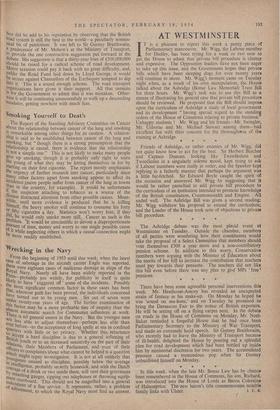AT WESTMINSTER
T is a pleasure to report this week a pretty piece of Parliamentary manoeuvre. Mr. Wigg, the Labour member for Dudley, has been trying for a week or two now to get the House to admit that private bill procedure is clumsy and expensive. The Opposition leaders have not been eager to take up this issue, and the Government hopes that private bills which have been sleeping dogs for over twenty years will continue to snore. Mr. Wigg's moment came on Tuesday night when, as a result of his own manipulation, the House talked about the Ashridge (Bonar Law Memorial) Trust Bill for three hours. Mr. Wigg's task was to use this Bill as a means of illustrating his general case that private bill procedure should be reviewed. He proposed that the Bill should impose upon the curriculum of Ashridge a study of local government and its development " having special regard to the standing orders of the House of Commons relating to private business." Unhappy students ! Mr. Wigg and his friends—Mr. Swingler, Mr. Usborne and Mr. Michael Stewart among them—had excellent fun with their concern for the thoroughness of the training at Ashridge.
Friends of Ashridge, or rather enemies of Mr. Wigg; did not quite know how to act for the best. Sir Herbert Butcher and Captain Duncan, looking like Tweedledum and Tweedledee in a singularly solemn mood, kept rising to ask if Labour members were really in order, and the Speaker kept replying in a fatherly manner that perhaps the argument was a little far-fetched. Sir Edward Boyle caught the spirit of the occasion and answered Mr. Wigg by suggesting that it would be rather parochial to add private, bill procedure to the curriculum of an institution intended to promote knowledge of the British constitution, Commonwealth and Elnpire. All ended well. The Ashridge Bill was given a second reading; Mr. Wigg withdrew his proposal to extend the curriculum; and the Leader of the House took note of objections to private bill procedlire.
* *
The Ashridge debate was the Most ,placid event at Westminster on Tuesday. Outside the chamber, members of all parties were wondering how their constituents would take the proposal of a Select Committee that members should_ vote themselves £500 a year more and a non-contributory pension scheme. In addition to this worry, Conservative members were arguing with the Minister of Education about the merits of her bill to increase the contribution that teachers must pay towards their pensions. The teachers did not like this bill even before there was any plan to givd MPs free' pensions.
There have been some agreeable personal interventions this week. Mr. Heathcoat-Amory has revealed an unexpected strain of fantasy in his make-up. On Monday he hoped he was 'sound on sea-lions,' and on Tuesday he promised to bring the Damascus Fair to the notice of British exporters. He will be setting off on a flying carpet next. In the debate on roads in the House of Commons on Monday, Mr. Noel- Baker reminded a forgetful House that he had once been Parliamentary Secretary to the Ministry of War Transport. and made an extremely lucid speech. Sir Gurney Braithwaite, who recently had to leave the Ministry of Transport because of ill-health, delighted the House by pouring out a splendid plan for road development which had been bottled up inside him by ministerial discretion for two years. The accumulated pressure caused a tremendous pop when Sir Gurney unburdened himself on Monday.
* *• In this week, when the late Mr. Bonar Law has by chance been remembered in the House of Commons, his son, Richard, was introduced into the House of Lords as Baron Coleraine of Haltemprice. The new baron's title commemorates notable
* *


































 Previous page
Previous page